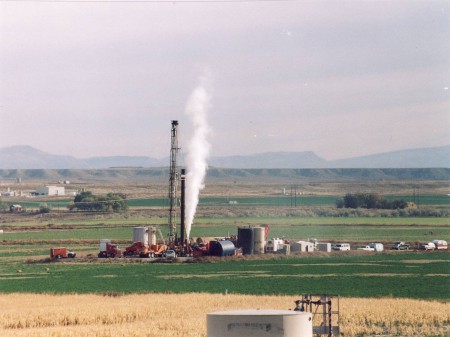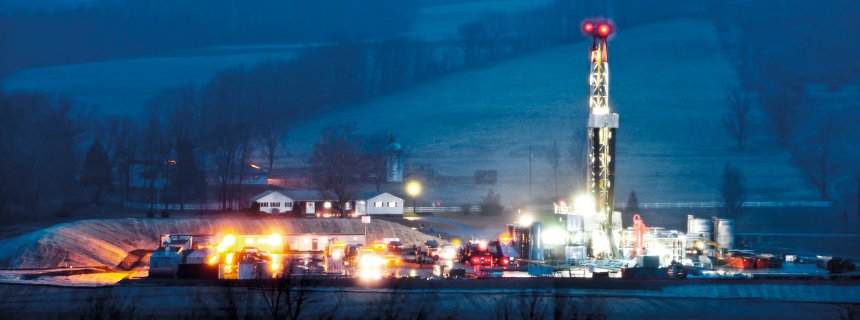Unfortunately, I cannot make a true blog about this experiment as I was unable to attend class last week. I can only comment on the painstaking way our group put most of the car together due to lack of lego pieces to fully build the car, though had success in operating the car via command from the USB connection to the computer.
Category Archives: Uncategorized
Holy Frack! The 21st Century Gold Rush
In a time when a rush for cleaner and cheaper energy sources worldwide have come nearly parallel in importance, the idea that such an energy source would be a ‘goldmine’ should come as no shock.
Take the city of Williston, North Dakota; it is a modern example of the gold rush that occurred in the west during the 1800’s. The city has doubled its sitting population almost overnight, and prices for living space and rent have skyrocketed to near major metropolis prices (ex. 1200 a month for mobile-home parking.) This is because the city is literally oozing with natural gas…so much so they have to burn the excess gas coming from the ground. The economy in the state is booming tremendously, and it will also impact the economy of the nation as it works its way across state borders and into markets across the state…and perhaps the globe. Take this article’s writing on the specifics of the situation:
“North Dakota now has virtual full employment, and the state budget showed an estimated surplus of $1.6 billion in 2012. Truck drivers in the state make $100,000 a year, while the strippers being brought in from Las Vegas rake in more than $1,000 a night. President Barack Obama calls the discovery of Bakken and similar shale gas formations in Texas, Colorado, Pennsylvania, Louisiana and Utah a “stroke of luck,” saying: “We have a hundred years’ worth of energy right beneath our feet.”
Our world has come to a point where energy is at a premium in the market, with costs for such high commodities as crude oil affecting citizens of all nations. Energy is business, and now business (particularly in North America) is very, very good! America’s energy market is undoubtedly the largest in terms of both demand and supply across the board (such as coal, wind, solar, gas, oil, etc), and the news in the last few months concerning our energy and fuel has been very promising; we are set to be the world’s leading oil producer in a matter of 5 years (1), and now we are the leader in the production of natural gas. Why? The use of Hydraulic Fracturing, and how it can (and perhaps will) benefit America in the very coming months….while also creating downsides due to conflicting energy sources.
Let us start with the obvious good an abundance of natural gas has done in nearly the last year: low consumer energy costs. Thanks to fracking, America’s abundance of natural gas in energy companies’ coffers have driven down the cost dramatically, making our energy bills at home much cheaper (assuming you use natural gas, of course). A simple look at the market listings for commodities show that natural gas current cost hovers around 3 dollars and 30 cents (2,3).
How can any of that be bad news? Doesn’t everyone want to pay less? Well of course…but the true issue lies in the competition…specifically coal. The Wall Street Journal reports,
Cheap natural gas has prompted utility companies to burn more of it and less coal, which has eroded coal prices. Both industries have been hit by weaker demand for power, partly as a result of warm winter months early this year …”On the coal side, it’s really taken a huge bite out of their business,” said Steve Piper, associate director at SNL Energy, a research firm” (4)
Any hit to the coal industry will be one that causes some kind of suffering…even if the end result does benefit the economy in the long run. These growing pains are due largely in part to the fact that coal supplies a majority of Americans with power, 42 percent in fact with natural gas being second at around 24% (5). Only time will reveal the results of balancing job growth and decline due to natural gas booms, as well as the supply and demand scale for said energy.
Another plus and minus to discuss with natural gas booming is the global impacts. I say impacts because there are a multitude of ways to see the global view on natural gas, but I chose to cover two; the exporting of excess gas and the competing nations in energy production. Should America ship this gas across the globe? Gas companies say yes, American consumers say no. The issue of allowing gas companies to export their abundant supplies abroad is feared to drive costs up dramatically from their near-historic lows currently…something the average American consumer does not want to see go away. I cannot blame them….cheaper is better…but at what principled cost?
The fix to this would be having government restrictions on companies exporting the gas. Morally i do not agree with this, as enterprise and government should be separate, but on a mixed practical/principled level the restrictions would do more harm than good, as caps on who to trade with and how much tend to drive up costs regardless due to lack of a competitive market …forcing a monopolized cartel in the future(after all, the 21st century is all about global markets now).(6) The nay-sayers to exports also worry about the demand for natural gas simply being too much to handle for our nation’s gas suppliers. These are great issues to be debated in the months to come, as the future of this energy source is traveling at very high speeds with thoughtful discussions needing to occur.
The supplemental issue, based on the assumption the US does export its abundance of natural gas, is how the energy competitors will react. With America expected to take over as leaders of both the natural gas market in tow years, and crude oil/petroleum in 5 (7), nations like Russia and Saudi Arabia are keeping a watchful eye on the American energy market. On the competition,
“The Russians could be on the losing end of the stick. The power of President Vladimir Putin is based primarily on oil and gas revenues. If energy prices decline in the long term, bringing down Russian revenues from the energy sector, Putin’s grip on power could begin to falter. The Americans’ sudden oil and gas riches are also not very good news for authoritarian regimes in the Middle East….But now the American natural resources boom threatens Putin’s dreams of an imperial resurrection of his country. It is already struggling with falling gas prices.”
Global competition appears to be shifting away from the East and back to the West…..THAT might be the biggest issue we see this decade. Will America be a leading exporter of energy versus its lead in import? Will other nations across the globe cash in with fracking technology as well to the levels the US might see (see Argentina, Germany, China, etc). The possibilities on fracking and the effects its has on the global future are in-fact endless…..and greatly deserve a watchful eye from folks beyond the scientific community.
Sources:
1) http://www.nytimes.com/2012/11/13/business/energy-environment/report-sees-us-as-top-oil-producer-in-5-years.html?_r=0
2) http://money.cnn.com/data/commodities/
3)http://www.bloomberg.com/energy/
4) http://online.wsj.com/article/SB10000872396390444592704578066964123991082.html
5)http://www.eia.gov/electricity/monthly/
6) http://www.usnews.com/news/articles/2013/01/10/should-the-us-export-natural-gas
7)http://www.spiegel.de/international/world/new-gas-extraction-methods-alter-global-balance-of-power-a-880546.html
Hurricane Sandy: Global Warming the Culprit?
 Let me first say I am not keen on Global Warming being the root cause of every natural disaster in the twenty-first century, and I refuse to drink the Al Gore kool-aid in that regard.
Let me first say I am not keen on Global Warming being the root cause of every natural disaster in the twenty-first century, and I refuse to drink the Al Gore kool-aid in that regard.
However, I am also not a Global Warming denier, as it seems pretty logical that the innovations from the twentieth century due to industrialization and population explosions through both world wars should cause a major change in our atmosphere. Logic dictates the more people on earth consuming in industry/post industry nations equals more damage to our ozone layer. This should be especially true when we dropped nuclear bombs in the 1940’s that probably did more damage to the ozone layer than anything else!
But I digress; the impact of Global Warming is clearly an issue…though a debatable one as to how much. More specifically, how much did Global Warming play a part in the impact of Hurricane Sandy? It seems easy to point fingers at first due to the odd path of the hurricane and its unusual power….but closer examination would show places like New Jersey and New York City to be very ill-prepared for a hurricane in the first place. Again it seems awful convenient to blame global warming for such a horrible outcome, but it seems no objective study has been put to the front lines to speak on the occasion. Sources like the Huffington Post have multiple stories crying climate change from obvious sources of bias in politics and the climate advocacy industry (1). The best and most objective article from Ariana Huffington’s left-leaning news site was labeled “Climate Partly to Blame”, which takes responsibility to the accuracy of the situation, pointing out the record-breaking storm surge discovered in New York’s Battery Park (2). Blogs and opinion pieces ranging from UC Berkley to the New York Times echo the stretched claim of Sandy being a Man-Made Disaster, while others do reason down the claim as saying Global Warming does have impact on the severity of the storms as well as their frequency.
I do not disagree with those who can site 90+ years of evidence that hurricanes have become more frequent …..but I will speculate that the study of these storms likely began becoming reputable during that 90 years (3)! Humanity has been polluting since the late 19th century with the bulk of it coming during both world wars in the 20th, but the study of Hurricanes was not likely to be prevalent until the late 1970s to the early 1980s. I am cautiously skeptical on how much the climate has really changed over the century according to these people versus the common logic that a century of pollution has had a AN effect on our climate. In short, I believe in the effect based on the evidence, the storm surge and frequency since the late 80s….not in the quantitative amount of it.
So did Sandy have an effect from Global Warming? Of course; logic would suggest so due to how much humanity has grown in 100+ years. But Sandy was not guided over New York City by Global warming nor was the damage solely the product of it either (while evidence may suggest otherwise, their simply isn’t enough to say this is a matter of fact. See the big hurricane of 1938, the 1944 Great Atlantic Hurricane, Hurricane Carol 1954, Hurricane Gloria of 1985 and Hurricane Bob of 1990, to name a good amount). One writer made a pretty sensible claim towards the end of their article, noting:
“Of course, climate change did not create Hurricane Sandy, Mann said. Hurricanes and tropical storms would occur with or without global warming. But many climate models suggest that such storms will become more intense as the planet warms ….Several researchers mentioned that the geography of New York made it more susceptible to storm surges. The long and narrow shape of the Long Island Sound, for example, helped to channel the storm surge and make it bigger. Additionally, areas like Battery Park were built from landfill and thus are low-lying and flat.”
New York more susceptible to Hurricanes, no kidding? Does not take a scientist to discover a city of 8 million people densely populated on a set of varying islands low to the earth trapped within a cove of land to be absolutely pummeled by a big ole cloud of rain, wind, and lighting. Hell, Staten Island is a perfect example; a mostly flat chunk of land known for being New York City’s Dump was absolutely pummeled by rain.
Truth is, the Northeastern States are not prepared to handle a hurricane….in fact I’d argue no state seems to be able to handle one. Our cities infrastructure are outdated and our cities built ill-equipped to handle such storms (take New Orleans…a city built BELOW sea level). It still raises great questions for debate as to severity of storms in the last century based on human pollution. Sandy is no different, and should spark a debate in the right direction as to how cities across the country can prepare better for these circumstances. One suggestion; bury the power lines! Those darn things shouldn’t be up anyways, and can have a better chance of being sealed off underground away from water than hanging up ready to be blown away. Also, and this one is much more of a general human error; don’t build your houses on the water. Honestly, what do you expect to happen?
Let us just be a bit more insightful about these disasters, and not get caught up in the moment choosing to point fingers at big, easy targets.
Sources:
1) http://www.huffingtonpost.com/news/hurricane-sandy-global-warming
2) http://www.huffingtonpost.com/2012/11/06/hurricane-damage-climate-change_n_2081960.html
3) http://www.usnews.com/opinion/articles/2012/10/30/was-hurricane-sandy-caused-by-global-warming
A fair criticism on Germany’s Green Energy Policy
Since even before the 20th century, the people of Germany as a whole have been known as some of the world’s most efficient workers; resulting in a country with incredible infrastructure, economic output, and stability (post World War II of course). The German work ethic has reflected on their international exports of high quality manufactured goods despite the high cost of production due to quality goods and high labor costs. Another example would be the ever popular german transit systems; they’re always on time! . It should be of no surprise that the German people have once again set the bar very high for the rest of the world when it comes to energy production, and even how clean or ‘green’ it is. With smart management of resources and how they are allocated, the Germans have used governmental influence to help create and sustain lower and cleaner energy costs that have produced a successful system for the past 20+ years, with hopes to phase out all forms of nuclear energy (unlike their French counterparts; a leader in world nuclear energy) (1).
Many other nations can learn from the Germans and how they created so much renewable resources in the past decade, jumping to around 20+ percent of all energy used in Germany; however many other nations can also learn from the flaws within the German’s plan and how they acted on it right down to the bare bones of the legislation itself.
The best criticism I can offer is a critique on the German’s Renewable energy act in 2000. Heck, I’d go to the general method of promotion for the energy policy was flawed from the beginning; it used government influence and power to hand out contracts to companies to build on the renewable energy of the country, while promising the German people no charge for it (in tax increases). How can the government spend money without having the tax payers pay for it? Shift the costs to someone else! The idea of heavy regulation on those who use or produce polluting energy methods would help deflate the cost, though the main source of cost would be covered by specific Tariffs which keep green energy companies locked in via long-term contracts. (2)
Still wondering where the problem is? Ask the German people themselves. Acorrding to the Wall Street Journal:
“A growing rift over the direction of German energy policy triggered a European competition inquiry … as a union of more than 13,000 households and small businesses in the country complained that current legislation unfairly favors large industrial energy consumers. The European Union’s antitrust authorities said they are looking at whether exempting large German industries from paying the cost of subsidizing renewable energy violates EU rules prohibiting state aid to business, following a complaint from Bund der Energieverbraucher, a pressure group representing small energy users.”
Well well well, that could certainly be a problem, huh? While Germany isn’t exactly the shining example of free-market capitalism in the world (in fact, they are a perfect example of functioning corporatism), this a no-no for advocates of free markets. A true free market does not have the government play favorites with companies by giving tremendous tax breaks (also including breaks from their tariff program explained earlier) and playing favorites with the government’s energy contractors. The interference listed before is far from a genuine free market, which prevents smaller innovators from producing their own results…which if we read our economics 101 textbooks, DRIVES DOWN COSTS. With shelter and protection for big companies in this respect, the cost for the German consumer will only keep going up.
Is the previous statement truth? Further evidence suggests this is indeed the case:
“The costs are effectively paid for by electricity consumers through a surcharge on their power bills. Retail power prices also include charges for power-grid usage as well as taxes on electricity…[Germany] promotes renewable energy by granting fixed prices for the electricity that facilities such as wind- and solar-power plants produce … But energy-intensive industries have been freed from paying most of these levies, including exemptions for grid fees and the payment of energy taxes. Altogether, the heavy industries are relieved of around €9 billion in costs per year … The rapid expansion of renewable energies is widely seen as the main driver of rising energy prices in Germany, triggering a barrage of criticism from consumer groups.” (3)
Want more proof? Here is a report from Canada Free Press:
“Many people in Germany are no longer able to pay their electricity bills. Skyrocketingelectricity prices are making electricity unaffordable for a large number of Germans. The past year over 600,000 households had their power switched off in Germany because they can’t afford the skyrocketing electric bills…he upward trend in electricity pricesin Germany has continued unabated in the first half of 2012.” (4)
Why on earth would I write a blog trashing the policy of another countries clean air and renewable energy aspirations? Here is why: I hope all who read can take a more critical look at energy policies brought upon us by our administration and future ones here in the United States by sticking to smarter economic principles and guidelines. That way, the consumers (us) can still afford it and hopefully have a wider range of choices for clean energy in the coming years instead of one very expensive corpro-government alliance that breaks the average americans wallet both on pay day and bill day. It can very well happen to you; it’s happening right across the Atlantic in a country responsible for the financial future of almost the entire continent of Europe!!
Americans are the #1 nation for innovation and enterprise of anyone and everyone….I would hope we do not simply shove that aside for the sake of cleaner energy without first taking a step back and coming up with a solution that makes economical sense. Germany’s issues are systemic, in that their economic structure revolves around their own version of capitalism in which companies are sheltered and protected by the government….successfully so thanks to a high demand internationally for their Mercedes, BMWs, and BlauPunkt sound systems. We Americans love to consume…..too much in fact! The issues with us are very much different but no less dangerous if legislation is rushed in and forced upon us without a good amount of time to review the costs associated with an update into the 21st century for energy. I do not deny the long-term costs going down on renewable energy…..but the way in which these energy sources are put in should be just as important as how important they are to our environmental future!
In short, how do we fix this? Short answer is this: let the free market do its job unopposed. We as Americans are brilliant enough to have a guy or gal one day come up with an idea in their garage that can change the world (Bill Gates, Steve Jobs, etc)….let us encourage that!
sources:
1) http://www.spiegel.de/international/crossing-the-20-percent-mark-green-energy-use-jumps-in-germany-a-783314.html
2)http://en.wikipedia.org/wiki/German_Renewable_Energy_Act#Founding_of_the_German_Renewable_Energy_Act
3)http://online.wsj.com/article/SB10001424127887323751104578149144050909144.html
4)http://www.canadafreepress.com/index.php/article/47243
Hello world!
Welcome to Blogs.cas.suffolk.edu. This is your first post. Edit or delete it under Manage>Posts or make a new one under Write>Posts then start blogging! Be sure to visit the Design tab to choose a new look for your blog as well.
Also, for immediate “how-to’s” visit the Tutorials section, or the Getting Started section.











